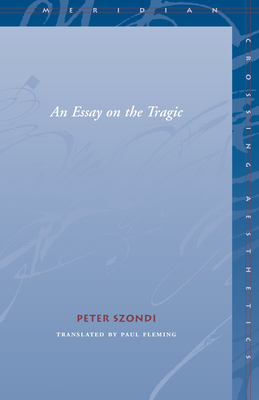Essay on the Tragic

Essay on the Tragic
Peter Szondis pathbreaking work is a succinct and elegant argument for distinguishing between a philosophy of the tragic and the poetics of tragedy espoused by Aristotle. The first of the books two parts consists of a series of commentaries on philosophical and aesthetic texts from twelve thinkers and poets between 1795 and 1915: Schelling, Hölderlin, Hegel, Solger, Goethe, Schopenhauer, Vischer, Kierkegaard, Hebbel, Nietzsche, Simmel, and Scheler. The various definitions of tragedy are read not so much in terms of their specific philosophies, but rather in the way their views assist in analyzing tragedies with an aim to establish a general concept of the tragic.
The second part presents exemplary analyses of eight tragedies: Sophocles'Oedipus Rex, Calderons Life Is a Dream, Shakespeares Othello, Gryphius Leo Armenius, Racines Phaedra, Schillers Demetrius, Kleist's The Schroffenstein Family and Büchner's Danton's Death. The readings neither presuppose a concept of the tragic determined by context (as in Hegel's idea of the conflict between two orders of right), nor do they focus exclusively on the texts explicit contents. Instead, they elaborate the dialectical or aporetic structures at the heart of the tragic. The works analyzed represent the four great epochs of tragic poetry: the age of Greek tragedy; the Baroque era in Spain, England, and Germany; French Classicism; and the age of Goethe.
PRP: 166.52 Lei
Acesta este Prețul Recomandat de Producător. Prețul de vânzare al produsului este afișat mai jos.
149.87Lei
149.87Lei
166.52 LeiLivrare in 2-4 saptamani
Descrierea produsului
Peter Szondis pathbreaking work is a succinct and elegant argument for distinguishing between a philosophy of the tragic and the poetics of tragedy espoused by Aristotle. The first of the books two parts consists of a series of commentaries on philosophical and aesthetic texts from twelve thinkers and poets between 1795 and 1915: Schelling, Hölderlin, Hegel, Solger, Goethe, Schopenhauer, Vischer, Kierkegaard, Hebbel, Nietzsche, Simmel, and Scheler. The various definitions of tragedy are read not so much in terms of their specific philosophies, but rather in the way their views assist in analyzing tragedies with an aim to establish a general concept of the tragic.
The second part presents exemplary analyses of eight tragedies: Sophocles'Oedipus Rex, Calderons Life Is a Dream, Shakespeares Othello, Gryphius Leo Armenius, Racines Phaedra, Schillers Demetrius, Kleist's The Schroffenstein Family and Büchner's Danton's Death. The readings neither presuppose a concept of the tragic determined by context (as in Hegel's idea of the conflict between two orders of right), nor do they focus exclusively on the texts explicit contents. Instead, they elaborate the dialectical or aporetic structures at the heart of the tragic. The works analyzed represent the four great epochs of tragic poetry: the age of Greek tragedy; the Baroque era in Spain, England, and Germany; French Classicism; and the age of Goethe.
Detaliile produsului











